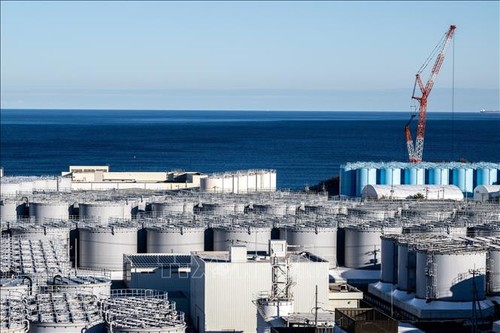 Tanks of contaminated wastewater at the Fukushima Daiichi nuclear power plant in Okuma, Fukushima prefecture, Japan, January 20, 2023. Photo: AFP/VNA Tanks of contaminated wastewater at the Fukushima Daiichi nuclear power plant in Okuma, Fukushima prefecture, Japan, January 20, 2023. Photo: AFP/VNA
|
At a regular press conference in Hanoi on Wednesday, Deputy Director of the Vietnam Agency for Radiation and Nuclear Safety Pham Van Toan said that on March 11, 2011, an incident occurred at the Fukushima Daiichi nuclear power plant in Japan due to the impact of an earthquake and tsunami, resulting in a large amount of radioactive wastewater.
 Deputy Director of the Vietnam Agency for Radiation and Nuclear Safety Pham Van Toan spoke at the regular press conference for the second quarter of 2023. Photo: TTTT Deputy Director of the Vietnam Agency for Radiation and Nuclear Safety Pham Van Toan spoke at the regular press conference for the second quarter of 2023. Photo: TTTT
|
On July 4, 2023, the International Atomic Energy Agency (IAEA) officially handed over an assessment report to the Japanese government, concluding that the Japanese government's plan for the discharge of treated wastewater into the sea is consistent with relevant safety standards.
According to the report, the concentration of radioactive substances in the water at a distance of 30km from the planned discharge location is very small compared to the natural background radiation level in the seawater and has almost no significant impact on the marine environment in terms of radiation.
The water stored at the Fukushima-Daiichi nuclear power station has been treated through an Advanced Liquid Processing System (ALPS) to remove almost all radioactivity, aside from tritium. Before discharging, Japan will dilute the water to bring the tritium to below regulatory standards, the IAEA added.
The Vietnamese official said it can be seen that the radiation impact from the discharge is negligible to both people and the environment in Japan. Consequently, this activity will not have any impact on Vietnam's sea areas.